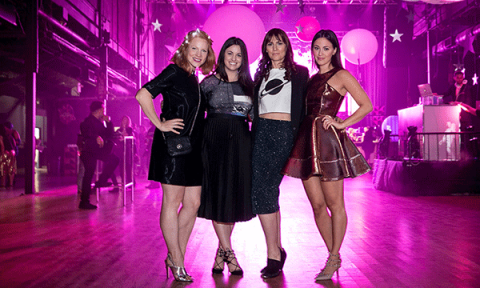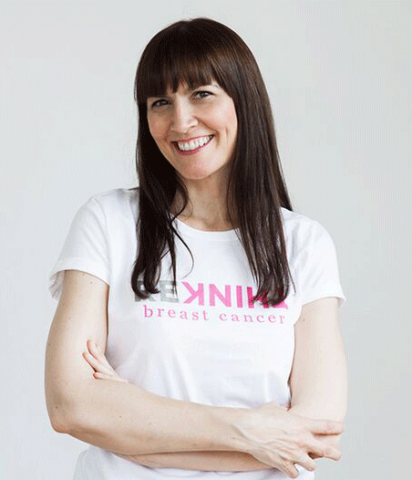
Despite the herculean efforts of doctors, researchers and scientists the world over, cancer doesn’t appear to be going anywhere fast. Campaigns such as Breast Cancer Awareness Month, staged each October, stubbornly remain. But progress is being made in lockstep with some pretty remarkable stories. Rethink Breast Cancer is one of those stories.
Launched in 2001 by MJ DeCoteau, who lost her mother Anne DeCoteau to the disease, Rethink Breast Cancer specifically serves young women battling breast cancer but feeling adrift among typically older patients in cancer wards. Crucially, it also educates young woman unaware that breast health matters at every age. And it speaks to both in a 21st century voice they understand.
Since its inception, Rethink Breast Cancer has raised over $10 million dollars, becoming not just an inspiring force in the breast cancer awareness movement but the go-to resource for younger women otherwise impervious to old school, pink-ribbon-esque messaging. Its Boobyball fundraiser is now in its 14th year and takes place in multiple cities, including Calgary Oct. 23, Winnipeg Nov. 7 and Ottawa Nov. 13. Toronto was Oct. 2.
Indeed, it’s hard to imagine the Canadian Cancer Society trumpeting “Easy, breezy TLC cards and self-check reminder apps for your phone,” as Rethink Breast Cancer does. Yet by using cheeky campaigns and of-the-moment language, the Toronto-based organization has found a unique voice in the noisy cancer landscape. And they smartly leverage social media to stand out in what feels like an ADHD world.
Samaritanmag spoke with MJ DeCoteau — who serves as Rethink Breast Cancer’s executive director — about why the under-40 set needs to think about breast health… and how challenging it can be to grab those ears in a soundbite culture.
Your Mom died in 1992 when you were age 22 but Rethink Breast Cancer didn’t launch until 2001. What happened in the interim?
I had been volunteering for the cause for another organization before I started my own.
Is that when you identified gaps in the system, so to speak, when it came to younger people and breast cancer information, advocacy etc…?
Yes and I found those pretty quickly. After my Mom passed away I was looking for information. My maternal grandmother (Mary Phelan) also had breast cancer so I felt like a ticking time bomb. Was this going to happen to me? What I found was fold-out accordion-style pamphlets with a senior citizen pictured on the cover. I wasn’t engaging with that information and it occurred to me: if someone looking for information wasn’t getting it, what about all my friends who weren’t looking? And I also wanted to show my support for the cause which is common when you lose someone. You want to make a difference. I wanted to transcend pink ribbons and pink Avon teddy bears; things that didn’t appeal to a 20s-something student out seeing alternative rock bands. There seemed like an opportunity to do things differently and engage younger people to give them information in a way that would be more relevant to their lives.

Exactly. From the start, our internal mantra was: breast cancer is not just an older woman’s disease. And we were not your grandmother’s breast cancer charity. That resonated with us because we felt younger people weren’t even thinking about their own breast health. And we wanted to engage them in a positive, upbeat way that wouldn’t scare them and make them tune the message out. Young people don’t want to hear about death and dying and frightening statistics. So our messaging was, ‘You can be a part of this cause and make a difference.’
It seems the key pillars of your org are ‘using innovative campaigns, training grants for young researchers and supportive-care programs for young breast cancer patients.’ How difficult was it to define your mission at launch?
We hit the ground running. We had very dedicated volunteers and amazing oncologists advising us from the get-go and it started more of a fundraising and awareness movement. From there we had young woman with breast cancer finding us and loving what we were doing. That was an interesting situation because at that point we weren’t really set up to serve patient needs. When young women with breast cancer started sharing their stories, that’s when we were inspired to expand our mission to include patient support.
So how is breast cancer different for a 25-year-old than for a 50-year-old?
Young woman are in the prime of their lives. They’re busy starting careers, they’re in new relationships, planning weddings, having babies, raising young families and we’d see first-hand how all of that was side-lined by a breast cancer diagnosis. These women felt very alone and couldn’t relate to the other women in the cancer ward who were a generation or two older. At the same time they found it hard to relate to their own friends who weren’t dealing with breast cancer. Plus younger women typically have more aggressive cancer so the treatments are harsher which means more side effects. They really need support.
So we began as this organization that was branding a cause and making it relevant to young people and suddenly we had women in their early 30s who were dealing with Stage 4 breast cancer reaching out to us and we had to help. We figured out a way to balance the two audiences: engaging with young women in areas of breast health and also, over the past decade, engaging with young women battling breast cancer. We support uniquely because we understand young women and create programs, communities and opportunities that connect young women and make them feel like they’re still young women, even when their treatments have thrown them into early menopause and seen them lose their hair.
You’ve had some innovation and eye-catching campaigns over the years. Any favourites?
Well, Your Man Reminder [a smart phone app featuring hot guys reminding women to self-examine] definitely cut through the clutter in a way just reciting statistics never could. It went viral and was shared all over the place. [It currently has over 7 million YouTube views]. Rethink Breast Cancer also brought the Scar Project to Canada and we felt that really broke through as well. [The Scar Project is a series of large-scale, unvarnished portraits of young breast cancer survivors shot by fashion photographer David Jay]. That really moved the pink ribbon aside and showed the reality of breast cancer. That was a perfect example of blending buzz with depth.
Q&A CONTINUES AFTER YOUR MAN REMINDER VIDEO:
The landscape has changed dramatically since you launched Rethink Breast Cancer; the issue seems to be much more in the spotlight. Is that a good thing for you — awareness is up overall — or a bad thing because the charitable space is now busier?
It’s good that awareness is up and for most people breast cancer is out of the closet. I remember my Mom and my aunt whispering about it when my grandmother was diagnosed. That’s the strength of the breast cancer movement. I also think it’s easy to become complacent when you see so much coverage and all that pink. You hear about millions raised for research through walks and runs and I think people maybe think it’s taken care of. Stories of women dying or living with chronic illness still need to break through.
Also, despite all the information out there, we still continue to meet young women who are misinformed, who think you can’t get breast cancer if your breasts are very small or if you have implants. So we need to promote education and have comprehensive awareness about the facts and realities.
What’s the most vexing misconception about breast cancer?
It’s hard to pick just one. We really don’t know that much about it apart from the fact that the biggest risk factors are being a woman and growing older. We know we can influence some breast cancers with lifestyle behaviour such as exercising and reducing body fat. One thing I worry about — and maybe it’s the culture we live in — is that we all seem to have a short attention span. We live in a soundbite culture and sometimes it feels like the messaging behind fundraising, which can be quite complex, has to be boiled down to something snappy that will prompt people to make a donation.
That creates challenges to understanding the complexity and depth of the issues. As one example, ‘Early detection’ sounds good [as a slogan] but it’s not the be-all and end-all. We know the way a tumour behaves is more important than the size of the tumour when it was detected. We don’t want people to have a false sense of security.
Nike